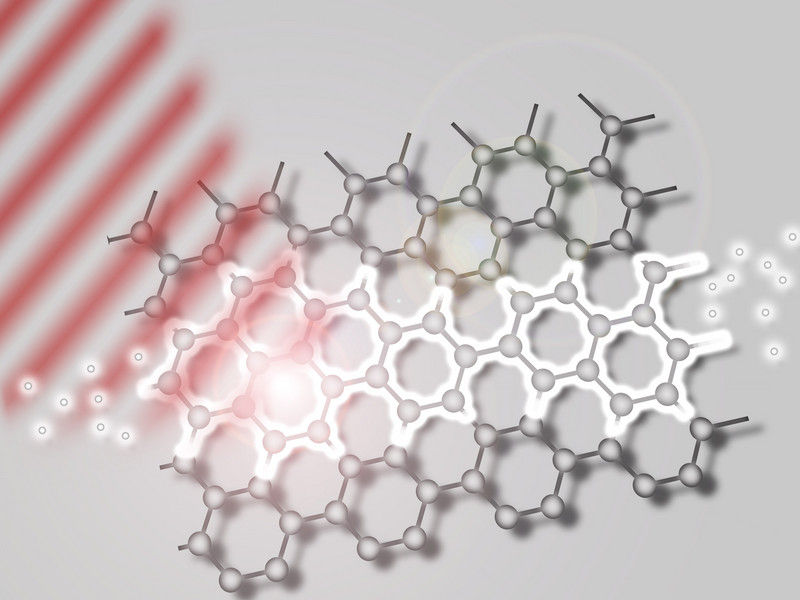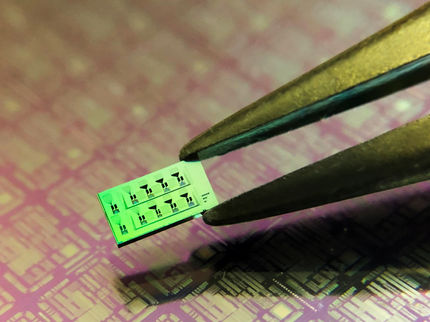New material promises faster electronics
High hopes are pinned on this new material: graphene, a honeycomb-like carbon structure, made of only one layer of atoms, exhibits remarkable properties. In 2010, the Nobel Prize was awarded for the discovery of graphene and its behavior. At the photonics Institute at the TU Vienna, the electronic and optical properties of graphene are the focus of interest. Viennese scientists could now demonstrate how remarkably fast graphene converts light pulses into electrical signals. This could considerably improve date exchange between computers.

Graphene: light makes the electrons flow
Converting Light into Electrical Signals
When data is transmitted by light pulses (for instance in fiber optic cables) the pulses have to be converted back into electrical signals, which can be processed by a computer. This conversion of light into electrical current is possible due to the photoelectric effect, which was originally explained by Albert Einstein. In certain materials, light can cause electrons to leave their positions and travel through the material freely, whereby electrical current occurs. “Light detectors which convert light into electronic signals have been around for a long time. But when they are made of graphene, they react faster than most other materials could”, Alexander Urich explains. He investigated the optical and electronic properties of graphene together with Thomas Müller and Professor Karl Unterrainer at TU Vienna.
Analysis using Ultra Short Laser Pulses
The scientists had already shown last year that graphene can convert light into electronic signals with remarkable speed. However, the reaction time of the material could not be determined – the photoelectric effect in graphene is so fast that it just cannot be measured by the usual measuring methods. But now, sophisticated technological tricks could shed some light on the properties of graphene. At TU Vienna, laser pulses were fired at the graphene photo-detector in quick succession, and the resulting photo-current was measured. If the time delay between the laser pulses is changed, the detector’s maximum frequency can be determined. “Using this method we could show that our detectors can be used up to a frequency of 262 GHz”, Thomas Müller (TU Vienna) says. This corresponds to a theoretical upper bound for data transfer using graphene photo-detectors of more than 30 gigabytes per second. It has yet to be determined to what extent this is technically feasible, but this result clearly shows the remarkable capability of graphene and its potential for optoelectronic applications.
Fast Signals for Fast Electronics
The main reason for the fact that graphene-photodetectors can operate at such high frequencies is the short life-span of the charge carriers in graphene. The electrons which are removed from their fixed position and contribute to the electrical current settle down at another fixed position after a few picoseconds (millionths of a billionth of a second, 10E-12 seconds). As soon as this happens, the graphene photodetector is ready for another light signal which frees new electrons, creating the next electrical signal.
The fast reaction time of graphene is one more item on the list of remarkable properties of this material. In graphene, charge carriers can travel extremely far without being disturbed. It can absorb light in a huge spectral range, from infrared to visible light – unlike standard semiconductors, which can only absorb a small part of the spectrum. In addition to this, graphene can conduct heat extremely well and has an exceptionally high breaking strength.
Original publication
Other news from the department science

Get the analytics and lab tech industry in your inbox
By submitting this form you agree that LUMITOS AG will send you the newsletter(s) selected above by email. Your data will not be passed on to third parties. Your data will be stored and processed in accordance with our data protection regulations. LUMITOS may contact you by email for the purpose of advertising or market and opinion surveys. You can revoke your consent at any time without giving reasons to LUMITOS AG, Ernst-Augustin-Str. 2, 12489 Berlin, Germany or by e-mail at revoke@lumitos.com with effect for the future. In addition, each email contains a link to unsubscribe from the corresponding newsletter.

























































